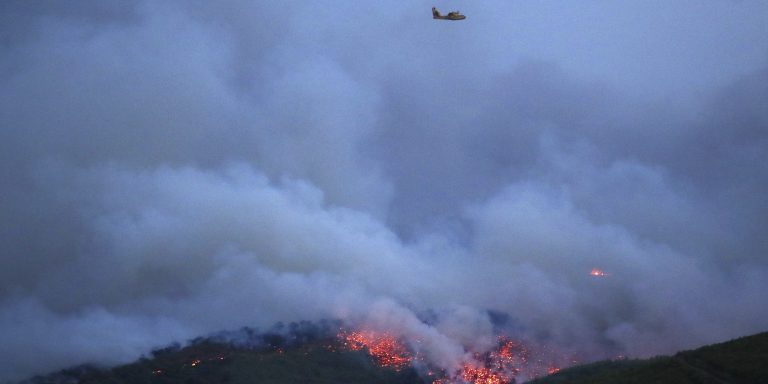INTELBRIEF
July 27, 2018
IntelBrief: A Planet on Fire

- Japan is experiencing a weeks-long heat wave with unprecedentedly high temperatures, in which 65 people were killed in one week.
- Metro Tokyo hit 40 Celsius and the city of Kumagaya hit 41.1, the highest temperature ever recorded in Japan.
- Much of Europe is baking under high temperatures and little-to-no rainfall while the Arctic Circle is extremely warm.
- The destabilizing consequences of a rapidly shifting climate are enormous and will continue to worsen.
.
The infamous heatwave and drought in the United Kingdom in 1976 saw temperatures that were an anomaly of red in an otherwise normal global heat map. Now, extreme heatwaves across the UK (with temperatures expected to hit 37 Celsius across parts of England, and perhaps break the record of 38.5 Celsius) no longer stand out. Across Europe, places are baking—and many places, including Greece, are literally burning. Asia and Africa are also experiencing what are no longer once-in-a-generation heat waves. The frequency of these heatwaves is growing as is their duration. Because of population growth, heat waves affect more people every year; governments are struggling to contain the impacts.
In Japan, more than 65 people died in one week as a direct result of the unprecedented temperatures on the island nation. Parts of metro Tokyo reached 40 Celsius, while the city of Kumagaya reached 41.1 Celsius, the highest temperature ever recorded for Japan. The high temperatures followed a flash flood in early July that killed 200 people in the western part of the country. As with any single weather incident, scientists cannot state that accelerating climate change is the cause of the floods—and now heat—in Japan, but they can say it is in line with their predictions. Japan is not the only East Asian country afflicted; South Korea is also battling historic high temperatures.
In Sweden, the combination of extreme drought and high temperatures has sparked large fires, some in the Arctic Circle region. While the arctic temperatures do swing dramatically from winter to summer, temperatures above 30 Celsius are creating havoc. Scientists assess that the polar regions are the most vulnerable to climate change and are serving as early-warning indicators of the dramatic changes to come. Further, the climatic chaos in the arctic is creating the conditions further south for drought and heat. The abrupt shifts in temperatures (on land, air, and sea) are changing air patterns, with the Jet Stream far more north than normal for this time of year. Norway recently saw a temperature of 33.5 Celsius, a record high.
On July 5, scientists recorded what might be the hottest official recorded air temperature on Earth, an incredible 51 Celsius (131 degrees Fahrenheit) in Algeria’s Sahara Desert. The heat is raising the ‘night low’ temperature as well, as places are unable to radiate out that much heat during the relatively cooler nights. For example, on June 26, Quriyat, Oman, recorded a ‘low’ temperature of 42.6 Celsius, the highest ‘low’ temperature ever recorded. Worse, Quriyat maintained that temperature or higher for 51 hours. While record high temperatures get most media attention, it is the ‘high lows’ that are a more accurate sign of a planet unable to cool itself.
The consequences of a rapidly warming planet blur all individual risk categories. Climate-led mass migration is already a reality but will grow exponentially worse as a pattern of persistent droughts, interspersed with devastating floods, takes hold over many parts of Africa, as well as the western United States and elsewhere. Energy demand will begin to consistently exceed supply, as seen in California last week where high temperatures led officials to warn of possible brownouts. Conflict over water will intensify as growing populations struggle to allocate a dwindling resource. Rising sea levels will displace millions and force rapid measures to adapt crucial ports and maritime installations. The speed of the change will be among the greatest challenges, as predictive models show an acceleration in the warming of the planet, leaving less time to ameliorate the situation—even if countries could work coherently together on this truly global challenge.
.
For tailored research and analysis, please contact: info@thesoufancenter.org
[video width="960" height="540" mp4="https://thesoufancenter.org/wp-content/uploads/2018/07/IB-0727.mp4" poster="https://thesoufancenter.org/wp-content/uploads/2018/07/AP_18204662256282.jpg"][/video]